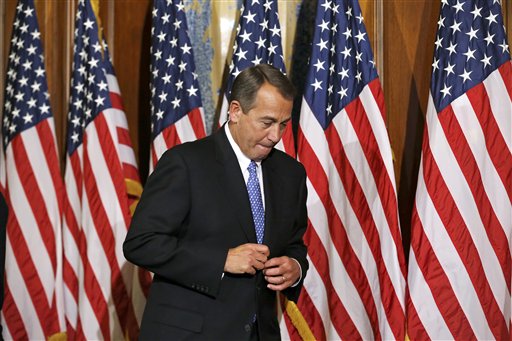(AP) Talk of GOP primaries follows ‘fiscal cliff’ vote
By THOMAS BEAUMONT
Associated Press
DES MOINES, Iowa
Republicans in Congress who took the politically risky step of voting this week to raise taxes now find themselves trying to fend off potential primary challenges next year from angry conservatives.
These lawmakers wasted little time in attempting to deliver an explanation that would be acceptable to the tea party and the GOP’s right flank, and, perhaps, insulate themselves from a re-election battle against a fellow Republican. They’ve started defending the vote as one that preserves tax cuts for most Americans, while promising to fight for spending cuts in upcoming legislative debates over raising the nation’s borrowing limit.
It was the first time in two decades that a significant number of Republicans voted for a tax increase; 33 Senate Republicans did so and 85 House members who broke with their GOP majority to support the bill that avoided the nation going over the so-called fiscal cliff but that also raises taxes on upper incomes.
Most if not all of these Republicans who voted to raise taxes are likely mindful of their party’s recent history of nasty primary battles that have pitted incumbents against tea party-backed insurgents. And none of them is likely to be immune to the scrutiny _ rising stars, powerful committee chairmen and Republicans in reliably Republican seats _ expected to confront them when they return to their districts to stand for re-election in November 2014.
The vote was a dilemma for Republicans, who have pledged for decades not to raise taxes, but faced being blamed with raising taxes on all Americans, had Congress and the White House not reached a deal on legislative to avert the scheduled increases on most Americans. The party got some cover from Grover Norquist, a leading anti-tax figure who described the bill, which preserved a series of tax cuts for most incomes, as “clearly a tax cut.”
Even so, the tea party wasn’t on board. Neither were many of the party’s most conservative lawmakers in Washington.
Lawmakers who could be vulnerable to a challenge include Michigan Rep. Dan Benishek and South Dakota Rep. Kristi Noem, who bucked her tea party base and backed the bill, calling it “damage control.”
Some Democrats who opposed the deal also might be called to account by their own liberal bases for voting for spurning President Barack Obama and refusing to go along with his election-year pledge to raise taxes on America’s top earners.
Among those who voted “nay,” were liberals like Iowa Sen. Tom Harkin. He sharply criticized the bill as overly generous to wealthy Americans, and had supported Obama’s original proposal to raise taxes on people earning at least $250,000 a year.
Harkin has not ruled out seeking a sixth term in 2014. And while his vote would likely prevent a primary challenge, it could be tricky for him in a general election.
Republicans _ and specifically in the House, where tea party fervor is strong _ seem more vulnerable.
While House Republican delegations, such as New York’s and Pennsylvania’s voted for the bill, they did so likely with impunity because the GOP bases in their states aren’t nearly as ideologically conservative as those in other parts of the country.
Wisconsin Rep. Paul Ryan, the 2012 Republican vice presidential nominee, also voted for the measure. It won’t likely be an obstacle to his re-election in his swing-voting district, but it could cause him trouble with conservative primary voters, should he run for president in 2016.
Rep. Steve Womack, in just his second term representing heavily conservative northwest Arkansas, could be forced to answer to tea party concerns over his yes vote if he seeks a third term. And he will almost certainly face questions about it should he run for U.S. Senate or governor, the subject of GOP speculation on which Womack has been silent.
Michigan Rep. Fred Upton’s backing of the measure might rile up conservatives enough in his right-leaning district in the western part of the state that he could face a challenger. But his stature may be enough to prevent a serious one: he has easily fought off recent primary opponents and, as chairman of the Energy and Commerce commission, would likely have the fundraising edge.
Upton’s Michigan colleague, Benishek, also voted for the bill and could have a bigger concern. He eked out re-election to a second term in November, carrying less than 50 percent of the vote in his northern district, and spurning tea party activists there could invite a threat from an opponent.
Among Senate Republicans, Sen. Saxby Chambliss of Georgia backed the measure and may have further agitated conservatives who were already cranky with him over his participation last year in the so-called “Gang of Six,” a bipartisan group that discussed fiscal plans including tax increases and changes to entitlement programs.
After the vote, Chambliss pointed quickly to the next phase of the fiscal fight as the place for redemption for what he called a flawed but necessary measure.
Chambliss and others say they will press for tying dramatically lower spending to support for raising the nation’s debt limit.
The swift defense from those who backed the increases is a response to GOP primary challenges from conservatives last year that proved costly to Republican members seen as dealmakers. Six-term Indiana Sen. Richard Lugar lost his primary to tea party favorite Richard Mourdock, and House Republicans Jeanne Schmidt of Ohio and John Sullivan of Oklahoma lost in primaries last year, attacked in part for voting to raise the debt ceiling.
___
Associated Press writers Bill Barrow in Atlanta and Alan Fram in Washington contributed to this report.
Follow Thomas Beaumont on Twitter: http://twitter.com/Tom_Beaumont

COMMENTS
Please let us know if you're having issues with commenting.